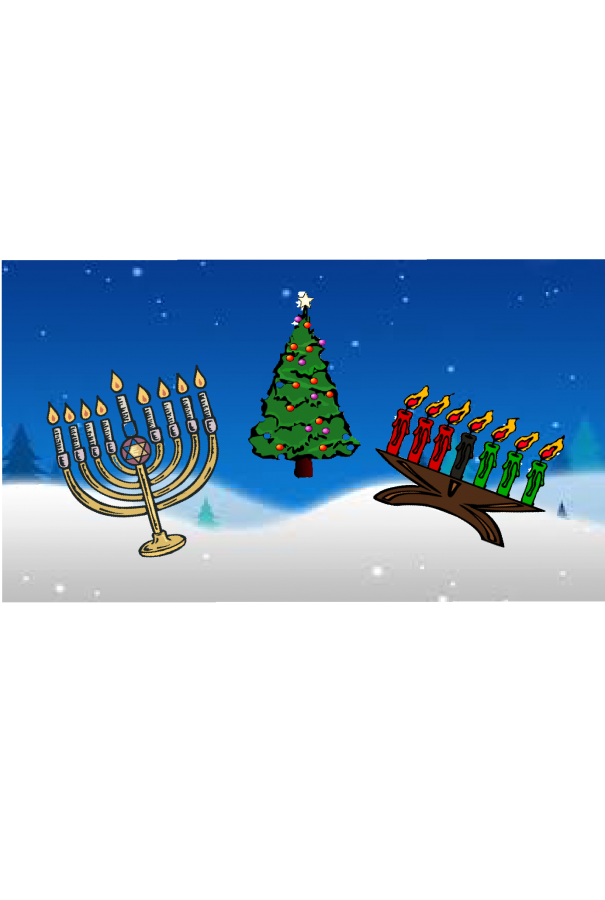Holidays around the world
The traditional winter holiday for Christianity, Christmas, celebrates the birth of Jesus every year on Dec. 25. While roasting chestnuts on an open fire and stringing popcorn and cranberries on a tree, it is easy to forget there is a world outside of Christmas and people who do not even celebrate it.
Hanukkah is one of the most well-known holidays outside of Christmas; it is celebrated by the Jewish faith Dec. 24 to Jan. 1, or Kislev 24 to Tevet 1, according to the Hebrew calendar. Hanukkah commemorates the miracle that happened after thousands were massacred, and a rabbi lead a rebellion to chase the attackers out of the land. Jews started rebuilding their temple and lit the menorah, but there was only enough oil to keep it lit for a single night. By some miracle, the menorah burned for eight nights, giving the Jews time to find more oil. Unlike the story of Jesus’s birth, the story of Hanukkah is not in the Hebrew holy text, the Torah.
The holiday is traditionally celebrated with the lighting of a menorah branch each night. Jews enjoy traditional foods like fried potato pancakes, or latkes, and round jelly donuts, or sufyganiyot, during the holiday, and children play games like the spinning dreidel where you must be in the “pot” if it lands on its upside. Gift are given each of the eight nights.
Another holiday, Kwanzaa, begins Dec. 26 and ends Jan. 1. Dr. Maulana Karenga created Kwanzaa in 1966, to find peace during the Watts riots in Los Angeles. Kwanzaa celebrations often include music and dances, African drums, storytelling, and a feast on Dec. 31. Similar to Hanukkah, on each of the seven nights of Kwanzaa, families gather, and a child lights one of the candles on the Kinara, or the candlestick. Each night, a different Nguzo Saba, or principle based on the values of African culture, is highlighted. Karenga created the seven principles: unity, self-determination, collective work and responsibility, cooperative economics, purpose, creativity, and faith. Each candle represents a principle; separate from the seven principles are the seven symbols. Each day of Kwanzaa emphasizes one symbol: the crops, the placemat, the ear of corn, the seven candles, the candle holder, the unity cups, and the gifts.
While Christmas, Hanukkah, and Kwanzaa get all the holiday glory, people celebrate other holidays and beliefs, as well. Two pagan holidays celebrated this month are Saturnia (honoring the deity, Saturn) and Yule which celebrates the winter solstice.
In Japan, people celebrate Omisoka on Dec. 31 similar to our New Year holiday. This holiday celebrates the final day of the old year and the entrance of the new one. It is all about having a clean and pure household for the New Year.
In the United Kingdom, Ireland, and Canada, Boxing Day is Dec. 26, and if the holiday falls on a Saturday or Sunday, it is considered a national holiday. Also celebrated on Dec. 26 is the feast day of Saint Stephen, the patron saint of horses, one of the reasons why Boxing Day involves horse racing and fox hunting.
St. Nicholas Day, a holiday entirely devoted to children, is a Christian holiday at the beginning of the month. Children get a small stocking full of toys, treats, clothes, and other fun surprises. St. Lucia’s Day is a Swedish holiday about stories of monks who brought Christianity to Sweden. The day honors St. Lucia, a woman who lost her life to bring food and water to Christians persecuted in Rome.
Catholics in Mexico celebrate the Fiesta of Our Lady of Guadalupe with a holiday feast. Three Kings Day is celebrated Jan. 6 when children wake up to find gifts left behind by the Three Wise Men.
With people around the world celebrating many different holidays, winter is a wonderful time for celebration.

Hi I'm Kellie Little and I'm one of the senior editors on The Talon! I obviously love writing, but I also enjoy baking, shopping (with money I definitely...


